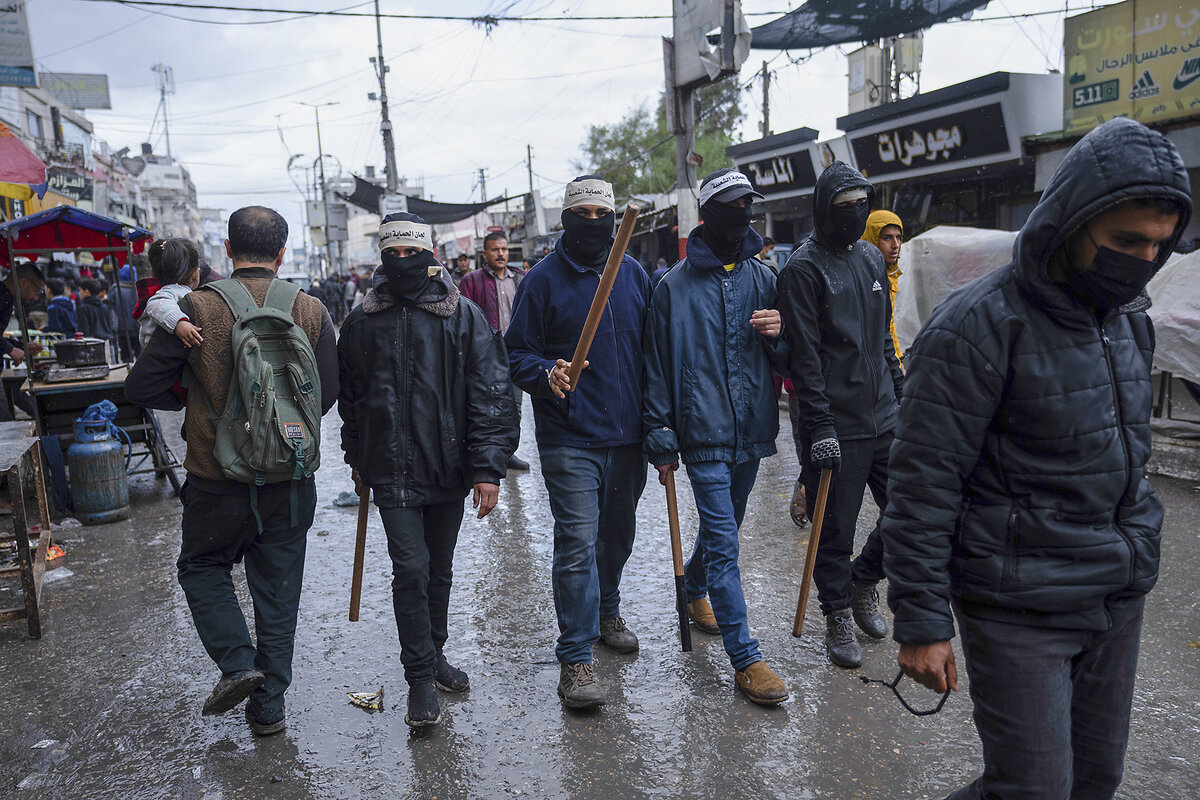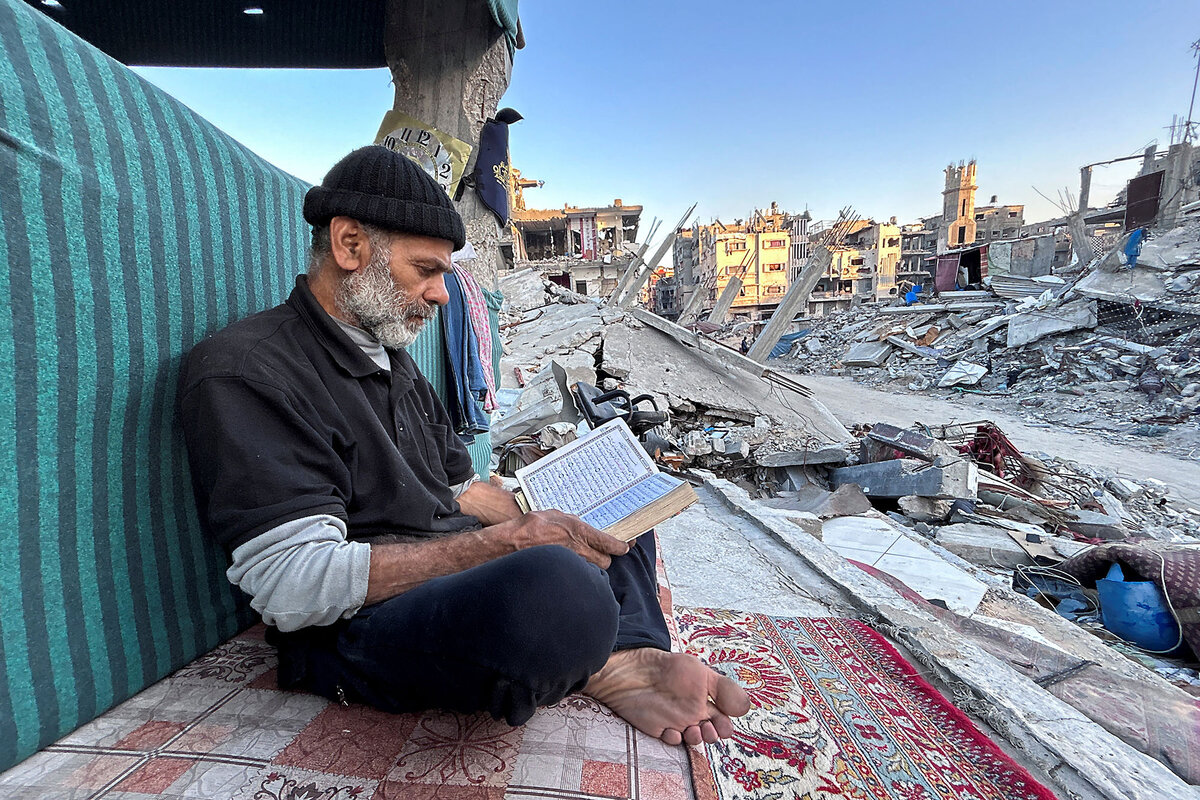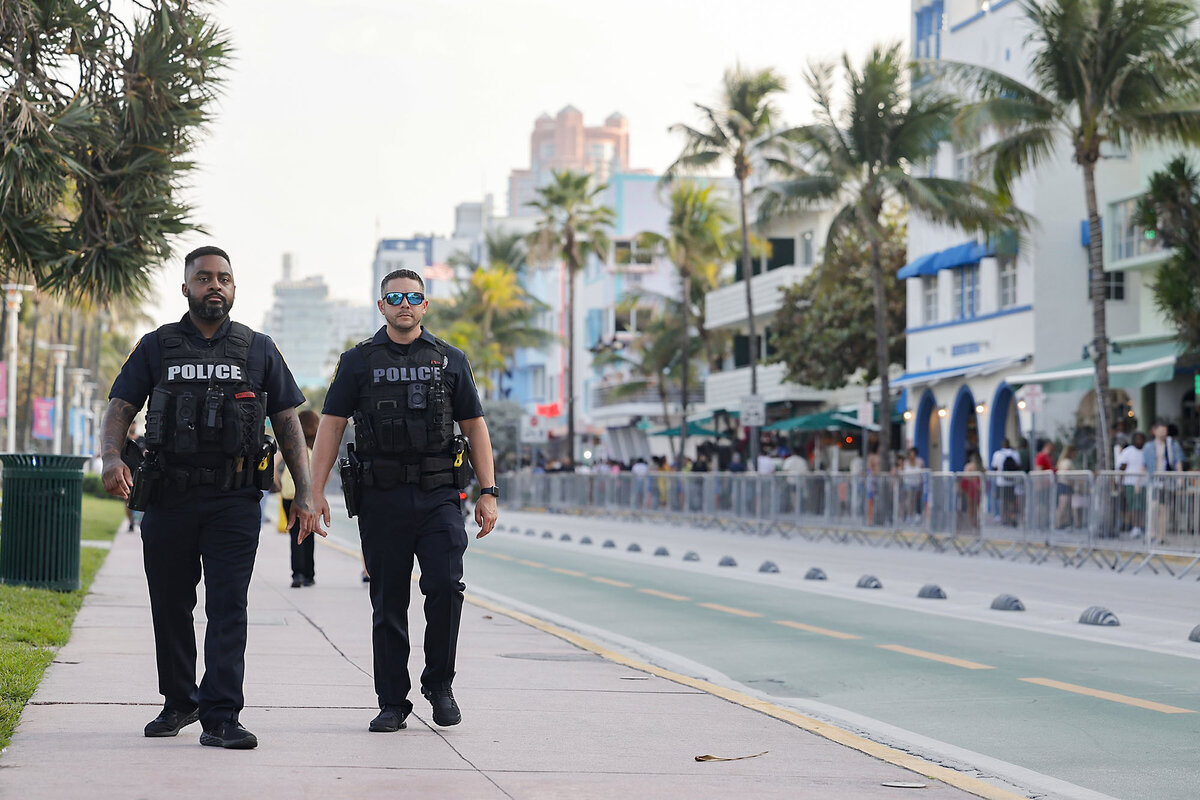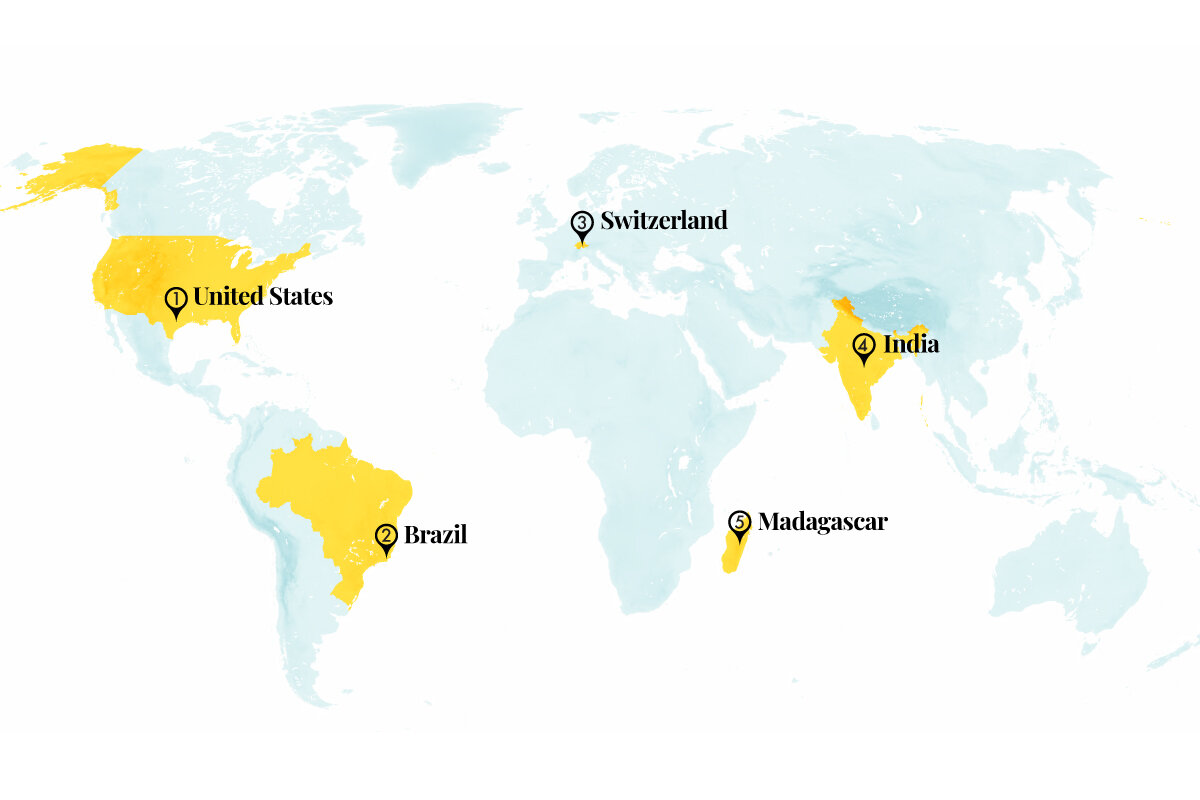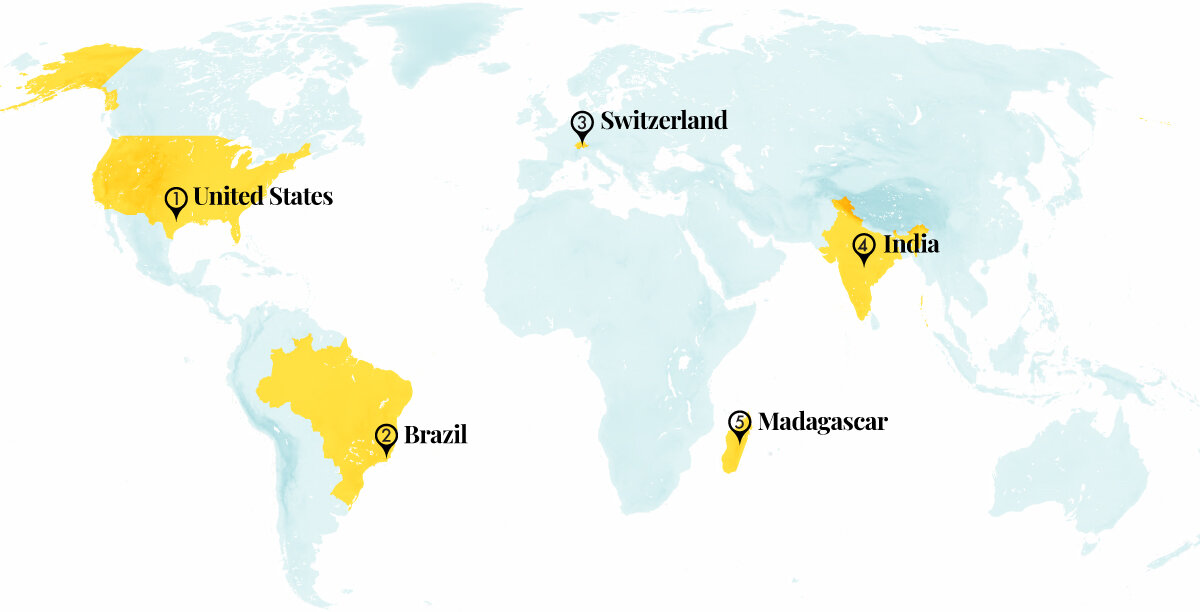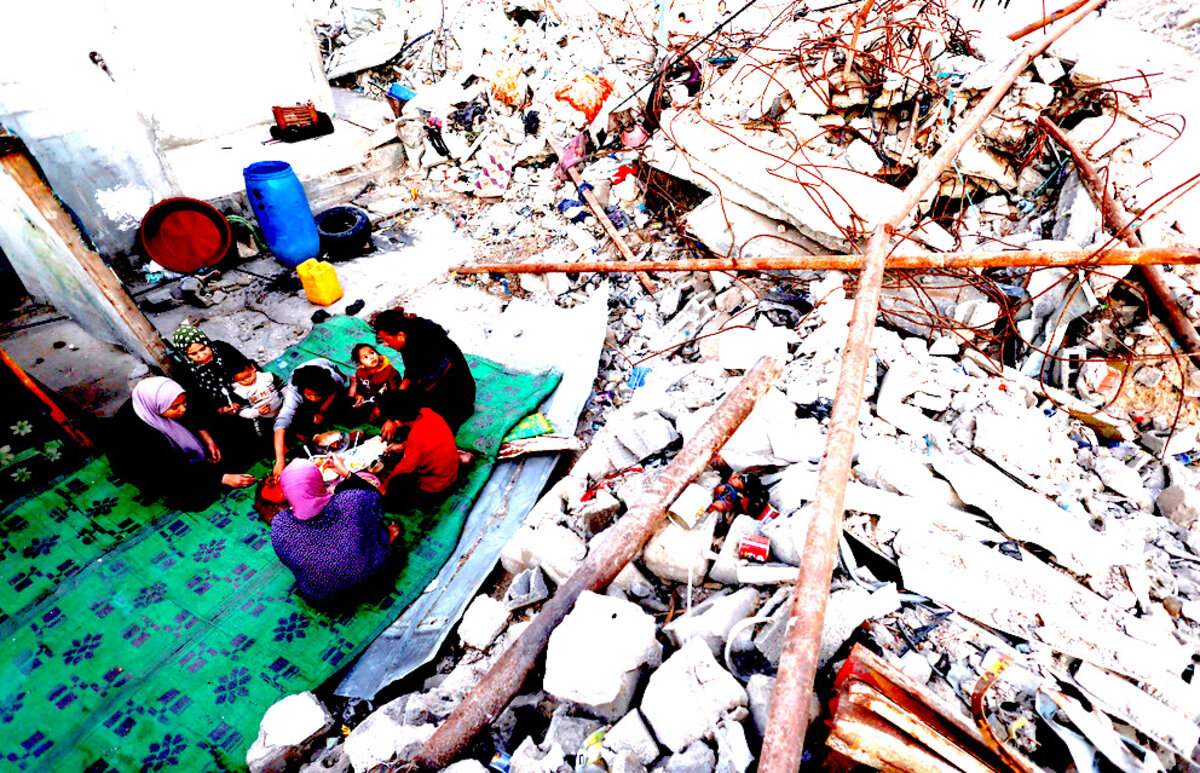For Palestinians in Gaza, anger at Hamas – while far outweighed by fury over Israel’s continued offensive – now sits alongside fear of reprisal for daring to show it. Our reporters looked at what that means for support of Hamas.

Why is ���Ǵ��� Science in our name?
Our name is about honesty. The Monitor is owned by The First Church of Christ, Scientist, and we’ve always been transparent about that.
The church publishes the Monitor because it sees good journalism as vital to progress in the world. Since 1908, we’ve aimed “to injure no man, but to bless all mankind,” as our founder, Mary Baker Eddy, put it.
Here, you’ll find award-winning journalism not driven by commercial influences – a news organization that takes seriously its mission to uplift the world by seeking solutions and finding reasons for credible hope.
Explore values journalism About usAlready a subscriber? Log in
Already have a subscription? Activate it
Ready for constructive world news?
Join the Monitor community.
SubscribeMonitor Daily Podcast
- Follow us:
 Clayton Collins
Clayton Collins
At key moments in history, “people power” has swelled as an expression of unity and will, a manifestation of agency.
It can be aimed at dug-in regimes or at upstart governments seen as not representing those whose interests they claim to defend. It takes many forms: deft opposition politics, violent clashes, and tactical persistence among them.
It can be snuffed out or take generations to succeed. What always lies at its heart: a fundamental yearning to be heard. Our first story today looks at what’s stirring in Gaza as Palestinians there, focused mainly on survival, begin – ever so tentatively – to more openly question Hamas.
Already a subscriber? Log in
Help fund Monitor journalism for $11/ month
Monitor journalism changes lives because we open that too-small box that most people think they live in. We believe news can and should expand a sense of identity and possibility beyond narrow conventional expectations.
Our work isn't possible without your support.
Today’s stories
And why we wrote them
( 7 min. read )
Today’s news briefs
• Israel strikes U.N. food center: It says that its March 13 airstrike on a facility in southern Gaza killed a Hamas commander. Palestinian health officials said it killed four more people including a United Nations worker.
• EU military aid to Ukraine: European Union countries agree to provide €5 billion ($5.48 billion) for military aid to Ukraine as part of a revamp of an EU-run assistance fund.
• Ransom demand in Nigeria: Gunmen who kidnapped 286 students and staff members from a school in northern Nigeria last week demand a total of more than $620,000 for their release.
• Some Trump charges dismissed: The judge in former President Donald Trump’s Georgia election subversion trial dismisses three criminal counts against him on March 13, while letting the overall case proceed.
• Finding in Oklahoma teen’s death: The death of transgender high school student Nex Benedict, the day after a fight inside a high school restroom, is ruled a suicide by the state medical examiner’s office.
Patterns
( 4 min. read )
There’s a rule for U.S. diplomats brokering peace between Israel and its Arab neighbors. It’s about motivations and desires, and ensuring that those are properly distributed. Our columnist explored a question: Will President Joe Biden ignore that guidance?
The Explainer
( 6 min. read )
Yale, Brown, and Dartmouth are among the highly selective colleges reinstating a testing requirement, saying it will help low-income students. Most other universities are keeping the tests optional, citing the same reason. Who’s right?
( 6 min. read )
An influx of partying college students floods Southern beaches every spring break. This year, Miami and other destinations are pushing back. Racial tensions and year-round residents seeking quiet are two of the undercurrents at work.
Points of Progress
( 5 min. read )
This progress roundup is about breaking from tradition. In Brazil, a group that parades at Carnival learns the joy of performing with women in the lead. And in India, women who pool their money are using solar pumps for their farms.
The Monitor's View
( 2 min. read )
Facing an American demand to “put civilians first” even as it rids Gaza of Hamas fighters, Israel announced Wednesday that it would follow that core principle of the rules of war in a particularly difficult choice. Palestinian civilians in Rafah – perhaps all 1.4 million of them – would be moved out of harm’s way before Israel launches major assaults on Hamas sites in the besieged city. The civilians would be settled in “humanitarian islands,” or guarded encampments of tents across southern Gaza.
In the history of modern warfare, negotiating such a deal to protect the innocent and ensure them aid is never easy. It requires those who uphold international law to take a principled stand. “Humanitarian actors are bound to abide by principles that are not negotiable,” said Claude Bruderlein, a former longtime negotiator on the front lines of conflicts for the International Committee of the Red Cross.
Those principles include an impartial commitment to the welfare of people who are not party to a war. A negotiator’s neutrality along with sincere interest in saving war-trapped civilians can build enough trust to allow the creation of a safe zone or a “humanitarian corridor.” If the parties to a war can agree on meeting the needs of the innocent, that shared interest opens a door for the tougher task of political negotiations.
Why do the innocent in a conflict so often evoke empathy from belligerents? U.S. Secretary of State Antony Blinken addressed that question in a recent press conference as he negotiated protections for the people in Gaza while supporting Israel’s right to protect itself.
“The overwhelming majority of people in Gaza had nothing to do with the attacks of October 7th, and the families in Gaza whose survival depends on deliveries of aid from Israel are just like our families,” he said. “They’re mothers and fathers, sons and daughters – want to earn a decent living, send their kids to school, have a normal life. That’s who they are; that’s what they want. ... We cannot, we must not lose sight of our common humanity.”
Israel’s goal of ending a military threat from Hamas can be met even as humanitarian law is upheld. For Israelis, their security is not negotiable. For innocent Palestinians as well, their protection from harm and access to humanitarian aid are not negotiable under international law. “There is no transaction about principles,” explained Mr. Bruderlein, the former front-line negotiator. On both sides, innocence can win.
A ���Ǵ��� Science Perspective
Each weekday, the Monitor includes one clearly labeled religious article offering spiritual insight on contemporary issues, including the news. The publication – in its various forms – is produced for anyone who cares about the progress of the human endeavor around the world and seeks news reported with compassion, intelligence, and an essentially constructive lens. For many, that caring has religious roots. For many, it does not. The Monitor has always embraced both audiences. The Monitor is owned by a church – The First Church of Christ, Scientist, in Boston – whose founder was concerned with both the state of the world and the quality of available news.
( 4 min. read )
Instead of holding to an individualistic mindset, we can recognize more of – and trust in – everyone’s unity with God, which brings harmonious outcomes.
Viewfinder

A look ahead
Thank you for giving us some of your time today. Tomorrow we’ll resume our ongoing project around rebuilding trust with a graphics-based global look at what rapid change has meant for trust in institutions, businesses, governments, and more.



